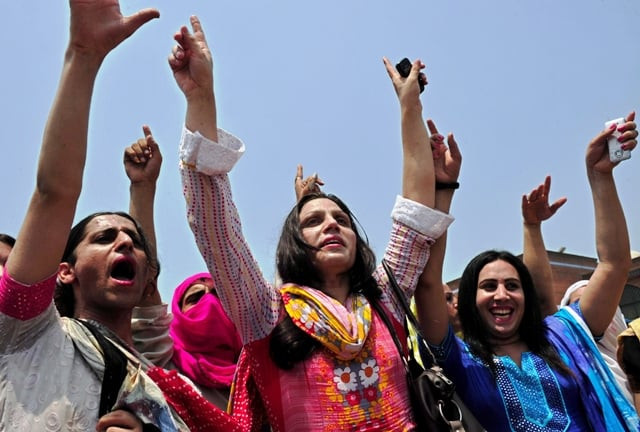Out on the streets: Transgender people continue to face adversities
Many of them encounter ostracism, exploitation in the city

PHOTO: AFP
Forced out of their homes across Khyber-Pakhtunkhwa, many people who are transgender moved to the provincial capital in search for a better life. However, they are still facing countless challenges.
Gul Ghote, 14, who belongs to the community, said she has faced discrimination and abuse in the city.
A resident of Shabqadar, Charsadda, Ghote was the youngest of her seven siblings. Her mother helped her escape from her house three years ago to save her from being murdered by her brothers.
“Peshawar was a strange city to me,” she told The Express Tribune. “People laughed at me and some even sexually harassed me.”
According to Ghote, one night over 10 people raped her at a party held on the outskirts of the city.
She was admitted to Khyber Teaching Hospital for three days. “I am fed up with my life,” she said. “I don’t have a good life here. This isn’t a place I can call home.”
Ghote said she does not have access to education or vocational training facility.
“I would like to study,” she said. “But I fear harassment.”
Ostracised
According to Ghote, when she was growing up her brothers kept her confined to their house.
Nevertheless, her father enrolled her in a primary school near their house, but there too she was harassed and laughed at.
“I managed to pass class four from the school,” she said. “But I could not continue as my brothers would not let me go to school.”
“I once wore a dress,” he said. “My brothers were enraged and shaved my head and locked me in a room. They beat me and told my mother they could not bear to see me in the house anymore as they were ashamed of me.”
Not alone
Ghote is not the only one to bear the brunt of this exploitation.
Earlier this month, Dil Roba was refused treatment at Lady Reading Hospital where she was taken when she contracted kidney pain. The doctors at the hospital refused to go near her and delayed her treatment for an hour.
Farzana, who is a representative of people who are transgender in K-P and Fata, accused the hospital authorities of failing to start her treatment immediately.
She said both the doctors and patients at the hospital were uncomfortable with the idea of a person who is transgender being present at the facility.
“When we took [Dil Roba] to the male ward, the authorities asked her to be shifted to the female ward where patients raised a hue and cry and asked she be shifted to the male ward,” she said.
According to Farzana, hospitals are not the only place where they face a discriminatory behaviour.
“The same thing happens on buses,” she said
Farzana added they have submitted several applications with the Directorate of Human Rights K-P to direct all the departments for equal treatment of people who are transgender, but they are still deprived of their rights.
Human Rights Directorate of K-P Director Noor Zaman Khattak said the directorate is committed to ensure the rights of people who are transgender in the province.
Brighter side
However, there are some who are going breaking stereotypes and are hence present in the workforce. Arzu, also a person who is transgender, works as a government employee.
“I was 11 years old when I realised I was in the wrong body,” she said. “Therefore, I started wearing makeup and dressing like a women, but I paid a high price for it.” She added she had to face aggressive behaviour, including cyber bullying.
However, she said her colleagues in the department she worked in were cooperative and she feels at ease at work, although it is a male-dominated set-up. She did not mention the name of the department she worked in.
Published in The Express Tribune, February 21st, 2016.













COMMENTS
Comments are moderated and generally will be posted if they are on-topic and not abusive.
For more information, please see our Comments FAQ